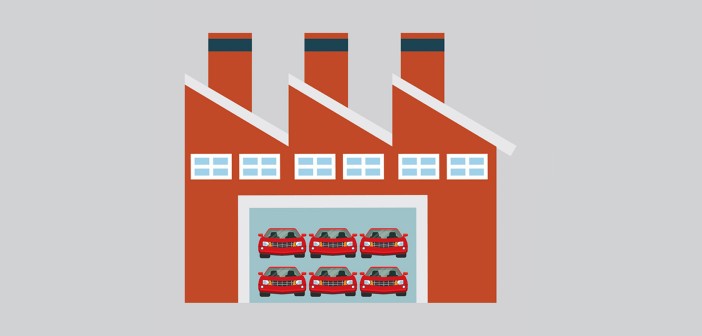General Motors recently announced that it would invest $1 billion across several U.S. plants, creating or retailing 1,500 jobs. Ford also announced it would cancel a planned $1.6 billion plant in Mexico and would instead invest $700 million to expand production in Michigan, adding 700 jobs. Chrysler recently announced it would invest $1 billion in Michigan and Ohio, adding 2,000 jobs while Toyota, Hyundai, and Kia have announced multibillion dollar investments, as well.
Apart from Ford’s outlay, it is unclear how much of this investment will reach Michigan. What is clear, however, is that despite the decline of the “Big 3” auto companies, car manufacturing remains a vital part of Michigan’s economy. Automobile manufacturing comprises less than one percent of the national economy, but it comprises 7.5 percent of Michigan’s economy.
Michigan’s continued reliance on auto manufacturing explains why its economy experiences larger swings than the nationwide economy. When there is an economic downturn, purchasing a new car is one of the first things consumers postpone. In the 2008-09 recession, car sales fell from a high of 17.4 million units sold in 2005 to 10.6 million units in 2009, causing Michigan’s unemployment rate to peak at 14.7 percent. In contrast, the national unemployment rate peaked at 10 percent.
The investments announced by the auto companies represent a vote of confidence for the economy going forward, since a strong economy is necessary for consumers to be confident in making a major purchase like a new car. Indeed, last year, auto sales hit 17.8 million units, a level not seen since 2000. This, and the fact that the average age of a vehicle on the road today is just over 11 years, bodes well for the auto industry and in turn, Michigan’s economy going forward.
Although these investments are important for the Michigan economy, they will not translate into many new jobs. For instance, Ford’s $700 million investment will create only 700 new jobs. The reason is that modern auto manufacturing is largely automated. In the 1960s, the average manufacturing worker produced about $40,000 worth of output in a given year. Today, it is nearly $200,000. Fewer workers simply are needed to produce the vehicles demanded by consumers. Indeed, one can visit a modern auto plant and find tasks that used to require 50 people currently being done by a couple of people using computers and robots. Automation means lower prices and more consistent quality for consumers; but it also means that manufacturing will never be the source of employment that it once was, either for Michigan or the economy, as a whole.
Michigan lost 800,000 jobs during the last decade and currently has 400,000 fewer jobs than in the year 2000. Auto manufacturing will continue to play a major role in Michigan’s economy, but it alone cannot make up for the jobs that were lost. A highly-educated workforce and strong overall business climate need to be in place, as well, to see continued and sustained job growth.














